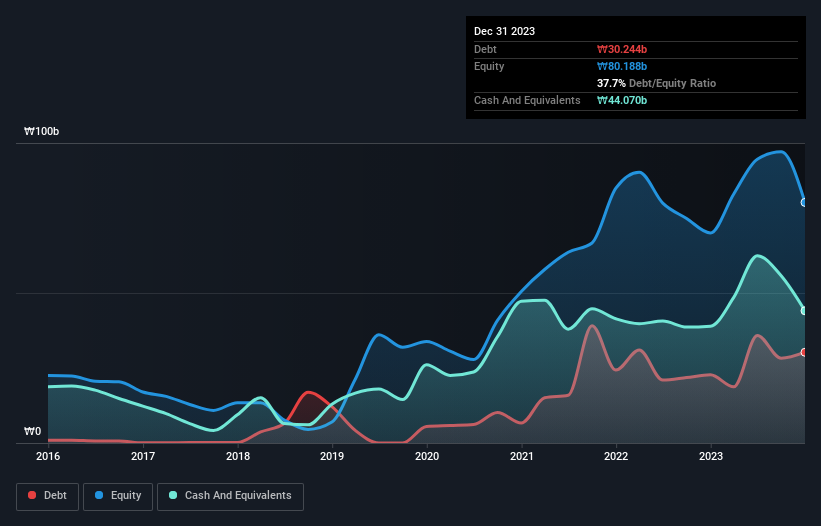Howard Marks put it nicely when he said that, rather than worrying about share price volatility, 'The possibility of permanent loss is the risk I worry about... and every practical investor I know worries about.' So it seems the smart money knows that debt - which is usually involved in bankruptcies - is a very important factor, when you assess how risky a company is. As with many other companies BENO TNR, Inc. (KOSDAQ:206400) makes use of debt. But the real question is whether this debt is making the company risky.
When Is Debt A Problem?
Debt is a tool to help businesses grow, but if a business is incapable of paying off its lenders, then it exists at their mercy. Part and parcel of capitalism is the process of 'creative destruction' where failed businesses are mercilessly liquidated by their bankers. However, a more frequent (but still costly) occurrence is where a company must issue shares at bargain-basement prices, permanently diluting shareholders, just to shore up its balance sheet. Having said that, the most common situation is where a company manages its debt reasonably well - and to its own advantage. The first step when considering a company's debt levels is to consider its cash and debt together.
See our latest analysis for BENO TNR
What Is BENO TNR's Debt?
As you can see below, at the end of December 2023, BENO TNR had ₩30.2b of debt, up from ₩22.7b a year ago. Click the image for more detail. But it also has ₩44.1b in cash to offset that, meaning it has ₩13.8b net cash.

How Healthy Is BENO TNR's Balance Sheet?
The latest balance sheet data shows that BENO TNR had liabilities of ₩40.5b due within a year, and liabilities of ₩2.25b falling due after that. On the other hand, it had cash of ₩44.1b and ₩11.4b worth of receivables due within a year. So it actually has ₩12.7b more liquid assets than total liabilities.
This surplus suggests that BENO TNR has a conservative balance sheet, and could probably eliminate its debt without much difficulty. Succinctly put, BENO TNR boasts net cash, so it's fair to say it does not have a heavy debt load! There's no doubt that we learn most about debt from the balance sheet. But it is BENO TNR's earnings that will influence how the balance sheet holds up in the future. So if you're keen to discover more about its earnings, it might be worth checking out this graph of its long term earnings trend.
In the last year BENO TNR had a loss before interest and tax, and actually shrunk its revenue by 55%, to ₩9.9b. To be frank that doesn't bode well.
So How Risky Is BENO TNR?
We have no doubt that loss making companies are, in general, riskier than profitable ones. And we do note that BENO TNR had an earnings before interest and tax (EBIT) loss, over the last year. And over the same period it saw negative free cash outflow of ₩7.8b and booked a ₩7.9b accounting loss. But the saving grace is the ₩13.8b on the balance sheet. That means it could keep spending at its current rate for more than two years. Even though its balance sheet seems sufficiently liquid, debt always makes us a little nervous if a company doesn't produce free cash flow regularly. When analysing debt levels, the balance sheet is the obvious place to start. However, not all investment risk resides within the balance sheet - far from it. To that end, you should learn about the 2 warning signs we've spotted with BENO TNR (including 1 which can't be ignored) .
If you're interested in investing in businesses that can grow profits without the burden of debt, then check out this free list of growing businesses that have net cash on the balance sheet.
Valuation is complex, but we're here to simplify it.
Discover if BENO TNR might be undervalued or overvalued with our detailed analysis, featuring fair value estimates, potential risks, dividends, insider trades, and its financial condition.
Access Free AnalysisHave feedback on this article? Concerned about the content? Get in touch with us directly. Alternatively, email editorial-team (at) simplywallst.com.
This article by Simply Wall St is general in nature. We provide commentary based on historical data and analyst forecasts only using an unbiased methodology and our articles are not intended to be financial advice. It does not constitute a recommendation to buy or sell any stock, and does not take account of your objectives, or your financial situation. We aim to bring you long-term focused analysis driven by fundamental data. Note that our analysis may not factor in the latest price-sensitive company announcements or qualitative material. Simply Wall St has no position in any stocks mentioned.
About KOSDAQ:A206400
Flawless balance sheet with slight risk.
Market Insights
Community Narratives



